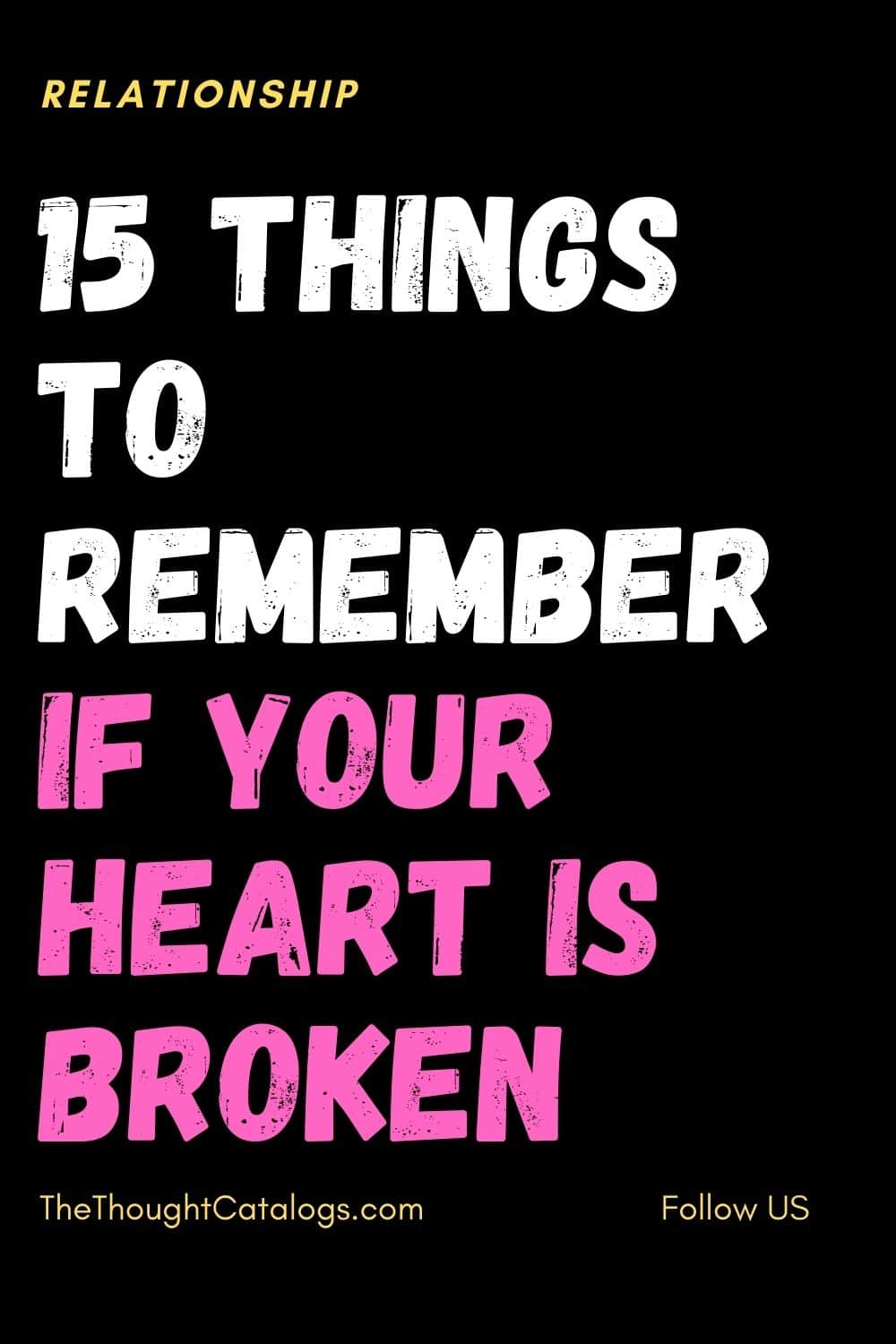
Introduction
Dealing with a broken heart can be one of the most challenging and emotionally draining experiences one can go through. Whether it’s the end of a long-term relationship, the loss of a loved one, or unrequited love, the pain can feel overwhelming. However, it’s important to remember that healing is possible. In this article, we will explore seventeen essential things to remember if your heart is broken. By acknowledging and implementing these tips, you can navigate the healing process and emerge stronger than ever.
1. Acknowledge your emotions
When your heart is broken, it’s crucial to allow yourself to feel the full range of emotions that come with it. Whether it’s sadness, anger, or confusion, permit yourself to experience these emotions without judgment. Acknowledging your feelings is the first step toward healing.
2. Allow yourself to grieve
Grieving is a natural response to loss. Give yourself the time and space to mourn the relationship or the person you have lost. Understand that healing takes time, and it’s okay to feel sad during this period. Surround yourself with supportive friends and family who can offer comfort and understanding.
3. Seek support from loved ones
During times of heartbreak, the support of loved ones is invaluable. Reach out to your close friends and family members who can provide a listening ear and a shoulder to lean on. Expressing your emotions and talking through your feelings can help alleviate the pain and provide much-needed support.
4. Take care of yourself physically
Taking care of your physical well-being is essential when your heart is broken. Make sure to get enough sleep, eat nutritious meals, and engage in regular exercise. Taking care of yourself physically can positively impact your emotional well-being and aid in the healing process.
5. Engage in self-reflection
Use this time of heartbreak as an opportunity for self-reflection. Ask yourself what you’ve learned from the experience and how it can contribute to your personal growth. Reflect on patterns or behaviors that may have contributed to the end of the relationship, and make a conscious effort to grow from them.
6. Avoid isolating yourself
While it may be tempting to isolate yourself and wallow in sadness, it’s important to resist that urge. Surround yourself with positive influences and engage in activities that bring you joy. Spending time with friends, pursuing hobbies, or volunteering can help distract you from the pain and foster a sense of belonging.
7. Practice self-compassion
Be kind to yourself during this challenging time. Treat yourself with the same compassion and understanding you would offer a close friend. Avoid self-blame and negative self-talk. Remind yourself that heartbreak is a universal experience and that you deserve love and happiness.
8. Keep a journal
Writing can be a therapeutic outlet for processing emotions. Consider keeping a journal to express your thoughts and feelings. You can reflect on your progress, document moments of healing, and gain insights into your emotional journey.
9. Find healthy coping mechanisms
Seek out healthy ways to cope with the pain of heartbreak. Engage in activities that bring you solace, such as meditation, yoga, or spending time in nature. Avoid turning to unhealthy coping mechanisms, such as excessive alcohol or substance use, as they can hinder the healing process.
10. Focus on personal growth
Instead of dwelling on the past, channel your energy towards personal growth. Set goals for yourself and work towards them. Focus on developing new skills, exploring new hobbies, or pursuing your passions. By investing in your personal growth, you’ll create a positive foundation for a brighter future.
11. Seek professional help if needed
If you find it challenging to cope with the pain of heartbreak on your own, don’t hesitate to seek professional help. Therapists or counselors can provide guidance and support tailored to your specific needs. They can help you navigate the complex emotions associated with heartbreak and facilitate your healing journey.
12. Embrace the healing process
Healing is a gradual process, and it’s important to embrace it fully. Understand that healing doesn’t happen overnight and that it’s normal to have setbacks along the way. Be patient with yourself and celebrate the small victories as you progress toward emotional recovery.
13. Surround yourself with positivity
Surround yourself with positivity and uplifting influences. Engage in activities that bring you joy, listen to uplifting music, or read inspiring books. Fill your life with positivity to counteract the negativity that may arise from a broken heart.
14. Set boundaries
Setting healthy boundaries is crucial when healing from heartbreak. Establish clear boundaries with your ex-partner or anyone who may be causing emotional distress. Prioritize your emotional well-being and communicate your boundaries assertively.
15. Let go of resentment
Holding onto resentment and anger can hinder the healing process. Practice forgiveness, both for others and yourself. Let go of past grievances and focus on creating a future free from negativity. Forgiveness is a powerful tool that can bring peace and emotional liberation.
Conclusion
Healing a broken heart takes time, patience, and self-compassion. Remember to acknowledge your emotions, seek support from loved ones, and take care of yourself physically and emotionally. Embrace the healing process and allow yourself to grow from the experience. By implementing these seventeen things to remember, you can pave the way for a brighter future filled with love and happiness.
FAQs
1. How long does it take to heal a broken heart?
The healing process varies for each individual and depends on various factors, such as the depth of the relationship and personal resilience. It’s important to give yourself time to heal and not rush the process. Healing a broken heart is a gradual journey that requires patience and self-care.
2. Is it normal to still think about your ex after a long time?
Yes, it is normal to think about your ex even after a significant amount of time has passed. Memories and emotions may resurface from time to time, but it doesn’t necessarily mean you’re not healing. It’s crucial to acknowledge these thoughts and emotions and continue focusing on your personal growth.
3. Can a broken heart lead to physical symptoms?
Yes, a broken heart can manifest in physical symptoms. Some common physical symptoms include chest pain, fatigue, changes in appetite, and difficulty sleeping. It’s important to take care of your physical well-being while healing emotionally and consult a healthcare professional if you have concerns.
4. How do I forgive myself for past mistakes in the relationship?
Forgiving yourself for past mistakes can be challenging but essential for healing. Start by acknowledging your mistakes and accepting that they are a part of your journey. Practice self-compassion and remind yourself that everyone makes mistakes. Focus on personal growth and learn from those experiences to create a better future.
5. Will I ever love again after a heartbreak?
Yes, heartbreak does not mean the end of love. Over time, as you heal and grow, you will be open to new experiences and new love. It’s important to approach future relationships with an open heart and a willingness to learn from past experiences. Love has a way of finding us when we least expect it.





